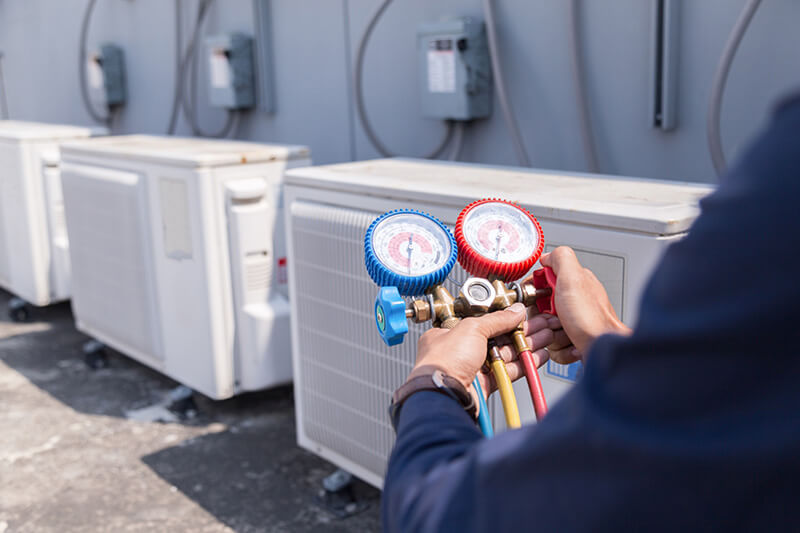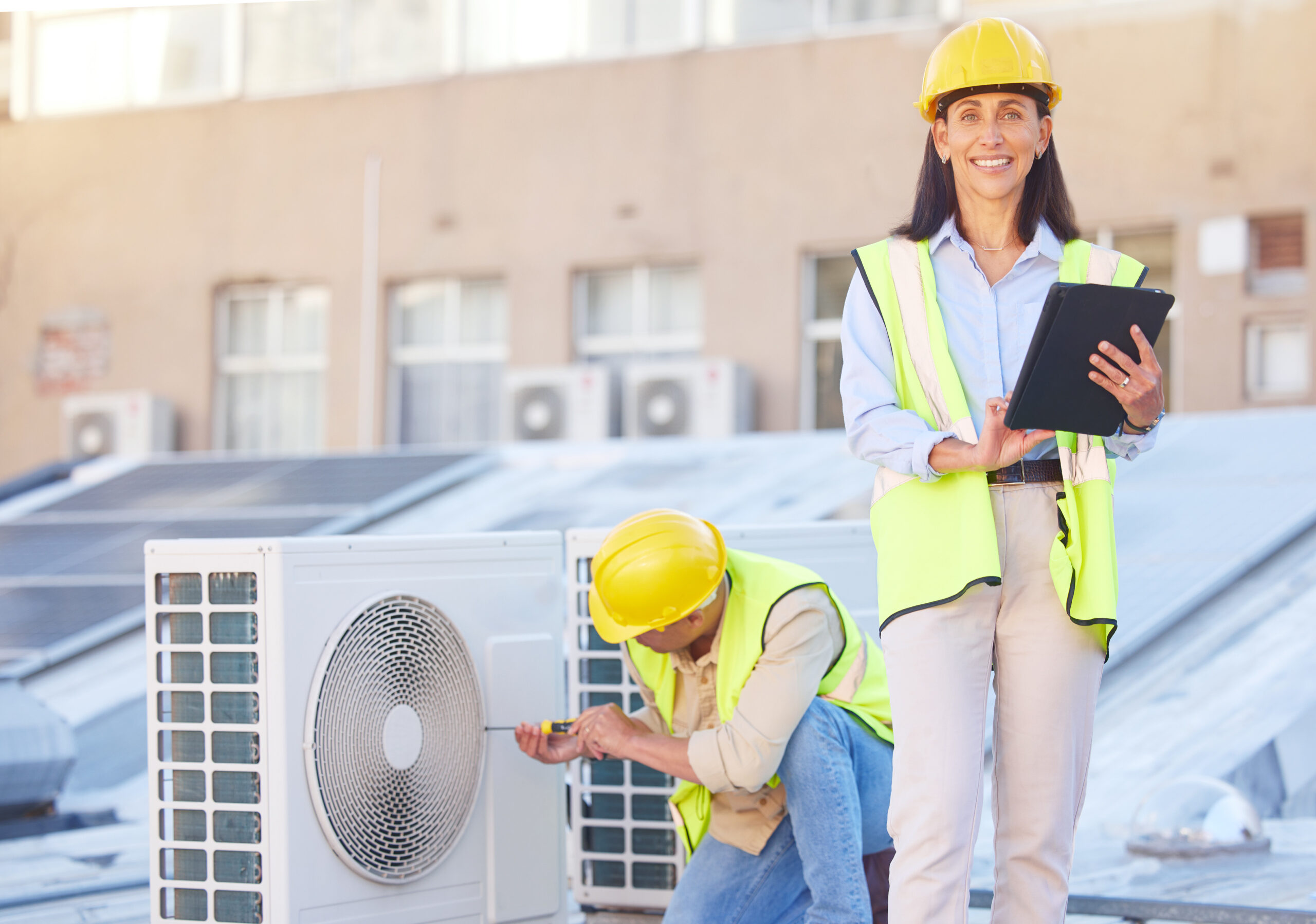Unlocking Prospective: The Duty of HVAC Workers in a Lasting Task Market
The cooling and heating sector is undergoing significant transformations as sustainability ends up being a top priority. Heating and cooling employees go to the leading edge of this adjustment, outfitted with the abilities to implement effective systems and environmentally friendly innovations. Their experience not only addresses present needs however additionally places them as important gamers in the future of energy preservation. As the landscape develops, comprehending their function will reveal just how they add to a greener economic climate and adapt to new challenges.
The Expanding Importance of Sustainability in cooling and heating
As the international emphasis on environmental issues heightens, the a/c market is progressively prioritizing sustainability. This shift mirrors a broader commitment to reducing carbon footprints and preserving energy. A/c systems, typically known for their power usage, are now being revamped to make the most of performance and lessen environmental influence. Sector stakeholders are incorporating sustainable methods, such as enhancing and utilizing environmentally friendly refrigerants system styles for reduced energy usage.
Furthermore, governing frameworks are evolving to urge greener innovations, compelling HVAC professionals to adjust to these changes. Training programs are being created to equip employees with the required skills to apply sustainable remedies. This growing emphasis on sustainability not just interest ecologically aware consumers however additionally placements heating and cooling employees as essential gamers in the evolution towards a greener future. As a result, the need for proficient professionals skilled in lasting methods in heating and cooling is anticipated to rise, forming a much more resistant work market.
Cutting-edge Technologies Changing the HVAC Market
Innovative innovations are reshaping the HVAC market, driving performance and boosting user comfort while resolving sustainability challenges. The combination of smart thermostats and IoT gadgets enables real-time tracking and control of heating and cooling systems, allowing users to enhance their power consumption. Furthermore, developments in variable cooling agent flow (VRF) systems supply efficient and flexible home heating and cooling services customized to certain structure demands.
Additionally, using sophisticated filtering innovations boosts indoor air quality, addressing health worries while promoting power effectiveness. Automation and predictive maintenance powered by expert system and maker knowing boost functional performance, reducing downtime and lengthening equipment life-span.
The surge of sustainable energy resources, such as solar-powered Heating and cooling systems, straightens with worldwide sustainability objectives. Collectively, these cutting-edge technologies are not just changing operational techniques yet likewise redefining the role and skillset of HVAC professionals in a quickly advancing market.
Energy Performance: A Secret Focus for Cooling And Heating Professionals
Power efficiency has arised as a primary worry for HVAC experts in light of current advancements and energy-saving practices. These developments not only improve system efficiency however additionally noticeably reduce the carbon footprint related to heating and cooling. HVAC Jobs Only. As the market advances, the dedication to energy performance will certainly play a crucial function in forming lasting a/c remedies
Technologies in Cooling And Heating Technology
While the demand for effective environment control remains to increase, cooling and heating professionals are progressively turning their attention to advancements that focus on power efficiency. Advancements in technology are reshaping the industry, with clever thermostats and variable cooling agent circulation systems getting traction. These developments enhance temperature level law while lowering power consumption. Furthermore, the combination of Internet of Points (IoT) gadgets enables real-time tracking and predictive upkeep, additional maximizing system performance. Green cooling agents are likewise being developed to minimize ecological influence. As energy efficiency comes to be an important emphasis, a/c employees are welcoming these technological developments, making sure that climate control solutions are cost-efficient and sustainable. Such developments not just benefit the setting but additionally enhance the general effectiveness of heating and cooling systems.
Energy-Saving Practices Implemented
As the a/c market develops, professionals are significantly taking on energy-saving methods that considerably improve efficiency. Specialists are currently concentrating on sophisticated diagnostic devices to examine system efficiency properly. Regular upkeep schedules have come to be basic, making sure perfect operation and protecting against energy waste. Professionals are additionally recommending high-efficiency tools, which makes use of innovative technologies to reduced power usage substantially. Additionally, the assimilation of clever thermostats enables tailored climate control, adjusting to user preferences while lessening excess energy use. Insulation enhancements and air duct securing are additionally stressed, making best use of the effectiveness of heating and cooling systems. Collectively, these practices not only boost functional effectiveness but likewise contribute to long-lasting cost savings for consumers, strengthening the crucial duty of HVAC professionals in fostering sustainable power solutions.
Effect On Carbon Footprint
The execution of energy-saving practices in the cooling and heating sector substantially influences the carbon footprint linked with home heating and cooling systems. By prioritizing power performance, cooling and heating specialists contribute considerably to minimizing greenhouse gas emissions. High-efficiency equipment, such as energy-efficient boilers and a/c, decreases energy consumption while maintaining optimal interior climates. In addition, routine maintenance and system upgrades assure peak operational efficiency, even more decreasing power use (HVACJobsOnly). Advanced modern technologies, consisting of wise thermostats and variable speed drives, permit for accurate control over power usage, bring about substantial decreases in carbon exhausts. Collectively, these practices not only boost sustainability but additionally position HVAC workers as essential players in the change towards a greener economy, eventually cultivating a much more lasting future for the setting and the industry
The Function of A/c Employees in Decreasing Carbon Footprint
Cooling and heating employees play an important duty in decreasing the carbon impact via power efficiency enhancements and the combination of sustainable energy resources. By enhancing air, air flow, and home heating conditioning systems, they add to decrease power intake and greenhouse gas emissions. Their experience not only boosts building efficiency but additionally supports more comprehensive sustainability goals.
Power Efficiency Improvements
While several markets are functioning to enhance sustainability, a/c workers play an important duty in applying power effectiveness renovations that greatly reduce carbon impacts. These specialists are vital in maximizing systems to reduce energy consumption and enhance efficiency. Through regular upkeep, check it out they ensure that cooling and heating systems run at peak efficiency, decreasing unneeded power use. Additionally, they are proficient in identifying obsolete equipment and recommending energy-efficient options, such as high-efficiency boilers and smart thermostats. Their know-how likewise encompasses educating customers about proper system use and seasonal modifications, even more advertising sustainable methods. By employing sophisticated innovations and best methods, cooling and heating workers contribute significantly to lowering greenhouse gas exhausts, making them vital players in the shift towards a greener future.
Renewable Energy Integration
As sustainable power sources gain traction in the quest for sustainability, HVAC employees are increasingly tasked with incorporating these innovations into existing systems. This combination entails the adoption of photovoltaic panels, geothermal systems, and energy-efficient warmth pumps, which greatly minimize reliance on fossil fuels. By retrofitting structures with these sustainable services, cooling and heating professionals play an important duty in lowering carbon impacts and boosting energy efficiency. Their know-how is essential in ensuring that these systems operate sympathetically within traditional HVAC frameworks. Furthermore, a/c workers contribute in enlightening clients regarding the benefits of renewable resource, fostering a shift toward extra lasting techniques. HVAC Jobs Only jobs. Inevitably, their contributions are crucial in advancing the sector's commitment to ecological stewardship and power preservation
Training and Abilities Growth for Sustainable Practices
To flourish in a quickly progressing task market, workers need to focus on training and skills development concentrated on lasting techniques. The cooling and heating industry is progressively integrating eco-friendly modern technologies, demanding that technicians acquire expertises in eco-friendly cooling agents and energy-efficient systems. Recurring education and learning programs are essential for employees to stay upgraded on emerging trends, such as wise building innovations and progressed environment control services.
Hands-on training and certification in sustainable practices not just enhance specific know-how yet additionally add to general industry requirements. Collaboration with educational institutions and market organizations can cultivate a workforce that is adept in sustainable HVAC remedies. Additionally, welcoming digital devices and software program for energy monitoring can even more encourage workers to carry out reliable systems. As the need for lasting techniques grows, cooling and heating experts outfitted with specialized training will be much better placed to meet consumer expectations and regulatory requirements, eventually reinforcing their value in the job market.
Career Opportunities in the Evolving Heating And Cooling Landscape
The evolving a/c landscape offers a wealth of occupation possibilities for experts geared up with cutting-edge skills and lasting techniques. As the need for energy-efficient systems rises, there is a boosting demand for specialists that are educated in eco-friendly technologies and eco pleasant remedies. Settings in layout, installation, and maintenance of innovative cooling and heating systems are becoming much more common, as firms look get more for to enhance efficiency and decrease carbon footprints.

The Future of HVAC: Patterns and Predictions for Sustainability
While the HVAC market remains to evolve, patterns suggest a strong change towards sustainability as an essential aspect of future growths. Innovations in energy-efficient systems, such as variable cooling agent flow and smart thermostats, are coming to be significantly widespread. These technologies not only reduce power intake yet additionally enhance individual comfort by enhancing environment control.
The assimilation of eco-friendly power sources, such as geothermal and solar systems, is likewise getting grip. This shift aligns with international initiatives to lower carbon impacts and battle climate change. On top of that, advancements in environment-friendly refrigerants aim to minimize ecological influence while keeping system performance.
As laws tighten up around energy efficiency and emissions, heating and cooling workers will require to adjust to new standards and technologies. Continual education and learning and training will certainly be vital for experts to thrive in this advancing landscape, guaranteeing they stay essential to the sustainability movement within the industry.
Often Asked Questions
What Qualifications Are Readily Available for HVAC Professionals Focused on Sustainability?
HVAC specialists can go after qualifications such as LEED Green Affiliate, EPA Section 608 Accreditation, and NABCEP Solar PV Installer. These credentials improve their experience in sustainable methods, energy effectiveness, and eco-friendly modern technologies within the market.
How Can HVAC Employees Advocate for Greener Practices Within Their Firms?
HVAC employees can support for greener practices by presenting study on sustainable modern technologies, suggesting energy-efficient remedies, participating in training sessions, and teaming up with management to establish environment-friendly policies that benefit both the atmosphere and the firm.
What Are the Common Misconceptions Regarding Cooling And Heating Careers in Sustainability?
Common mistaken beliefs concerning HVAC occupations in sustainability consist of the idea that these roles are entirely technological, do not have development possibilities, or do not greatly effect environmental efforts, weakening their crucial function in advertising power performance and eco-friendly practices.

Exactly How Does Climate Adjustment Affect Cooling And Heating Task Safety and Demand?
Environment modification increases demand for energy-efficient cooling and heating systems, improving work safety for heating and cooling specialists. As policies tighten up and awareness expands, competent workers are essential for carrying out sustainable options, making sure a robust future in the market.

What Are the Finest Resources for Continuing Education in Lasting Cooling And Heating Practices?
The most effective resources for continuing education and learning in lasting a/c techniques include on-line programs from accredited organizations, sector webinars, profession organizations, and certification programs concentrated on energy effectiveness, sustainable technologies, and sustainable design principles.
A/c systems, traditionally understood for their energy usage, are currently being upgraded to take full advantage of performance and decrease environmental effect. Heating and cooling employees play an essential role in decreasing the carbon footprint with power effectiveness renovations and the assimilation of eco-friendly energy resources. With normal upkeep, they ensure that Heating and cooling systems run at peak efficiency, reducing unnecessary power usage. As sustainable power resources obtain grip in the quest for sustainability, Heating and cooling employees are significantly tasked with integrating these innovations into existing systems. Environment adjustment enhances demand for energy-efficient Heating and cooling systems, boosting these details work security for Heating and cooling professionals.